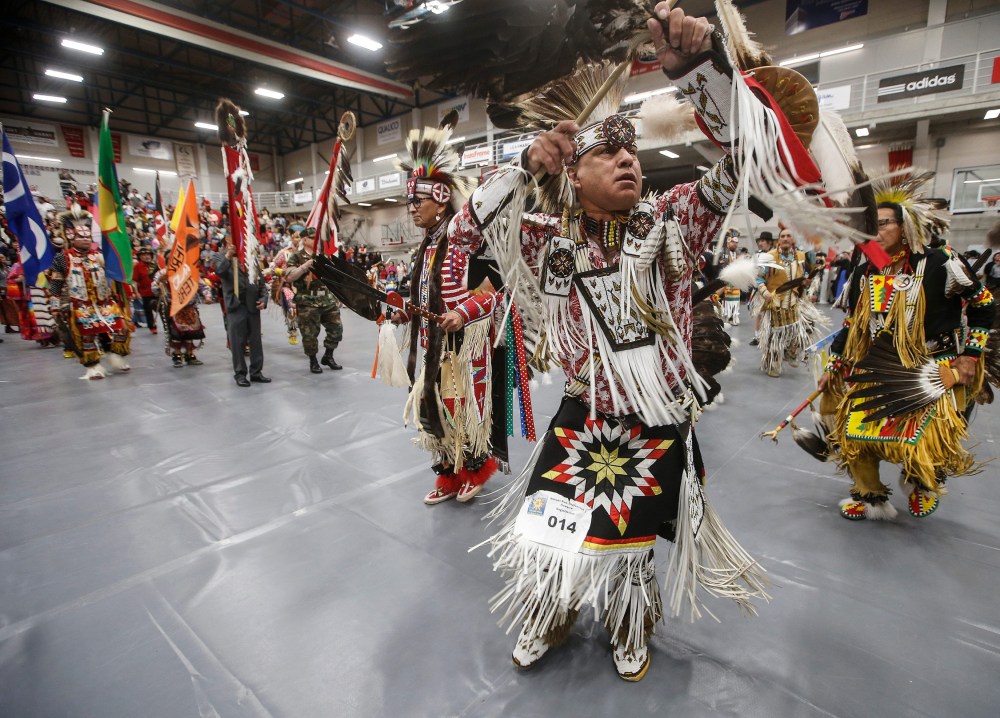It’s graduation powwow season, a fairly new phenomenon here in Manitoba.
It is a time of miracles.
In order to graduate from anything, every student from any background has to overcome struggles and accomplish what often seem like overwhelming goals.

For example, a Manitoba high school student needs 30 credit hours to graduate. That’s 30 courses (17 which are mandatory) — or 3,300 hours of instruction over four years.
On top of that, there are provincial tests, extracurricular activities and peer pressure.
For Indigenous students, there’s all this and more.
For many, there’s chronically underfunded schools, flooding and forest fires, and the harsh reality of travelling many kilometres away from home to finish schooling.
This is not to mention the very-real legacies of residential schools in Indigenous communities that lead to mistrust of Canadian education or shame about one’s own identity.
Add to this the vast amount of systemic racism that exists in Canadian textbooks, teaching and school hallways, and you get the picture.
The fact nearly every single version of the Canadian education system celebrates individuality, competitiveness, capitalism and learning inside of a concrete box more than what’s primarily valued in Indigenous traditions and communities — such as sharing, community and relationships with the natural world — illustrates how foreign schooling is for Indigenous students.
Things have certainly improved since my time as a student, but the fact remains that when any Indigenous student graduates from any level of Canadian schooling and is proud of being Indigenous, it is often in spite of the education system, not because of it.
Indigenous graduates are miracles, each and every one of them. If more than a century and a half of Canadian policies and practices had their way, none would be here in 2024.
So, graduation is a huge reason to have a powwow — the Indigenous world’s central way to celebrate.
Powwows combine ceremony, song and dance to honour how history, art, and knowledge — all parts of humanity — come together to create a beautiful world. Virtually every part of a powwow is about gift-giving, honouring something or someone (particularly ancestors and animals), and laughing at contradictions in the universe.
Graduations have always been celebrated in Indigenous communities, but mainstream institutions have only recently adopted powwows as a venue for recognizing and honouring Indigenous graduates.
Graduation is never about individual achievement but about the way people achieve through the immense gifts a community gives them.
The first major graduation powwow in a Manitoba educational institution was held by the University of Manitoba in 1989.
At the time, student Margaret King worked with then-Indigenous student adviser Kali Storm and other allies and staff members on campus to hold an event to honour Indigenous graduates. That first year, there were only two dozen or so graduates.
This past May, at the 35th anniversary of the U of M’s graduation Powwow, there was 150 (and 478 Indigenous graduates campus-wide).
Now, Red River College (24 years old), the University of Winnipeg (19 years old), and virtually every school division in Winnipeg (and many in rural Manitoba) hold a graduation powwow at the end of the school year.
The first high school graduation powwow in Winnipeg was held by Maples Collegiate in 2010.
At the time, Indigenous graduates insisted their non-Indigenous and Canadian graduates be permitted to join them and be honoured as well. That tradition still stands.
This is also why powwows are the perfect venue to build a future Manitoba.
In a powwow, everyone is welcome. There are no dances where an announcement is made “Indigenous peoples only.” All are encouraged to “dance their style” during what is called “intertribal” songs.
This is because powwows are a celebration of all life.
A graduate never graduates alone. In order to accomplish anything, a person needs friends, family and supporters to help them along the way — particularly in moments of struggle, strife and self doubt.
Graduation is never about individual achievement but about the way people achieve through the immense gifts a community gives them.
No graduate in history finished without relatives, teachers, ancestors and — perhaps most importantly — the earth and the water.
In the grand entry song at the start of every powwow, all of the non-human parts of creation are honoured. During the opening verse (often called a “pushup”), no one moves or, rather, space is made for spirits, non-humans and the universe to dance first.
It took many years and many forces to get to 2024, where more schools, universities and colleges are certifying more Indigenous graduates than ever before. These professionals will now work with all of Manitoba’s graduates to build a home we are beginning to see glimpses of.
A place full of miracles, where gift giving, honouring and laughter is possible.
Gimaamiikwenamigo nindinawemaganidog. Congratulations, my relations.
niigaan.sinclair@freepress.mb.ca

Niigaan Sinclair
Columnist
Niigaan Sinclair is Anishinaabe and is a columnist at the Winnipeg Free Press.
Our newsroom depends on a growing audience of readers to power our journalism. If you are not a paid reader, please consider becoming a subscriber.
Our newsroom depends on its audience of readers to power our journalism. Thank you for your support.